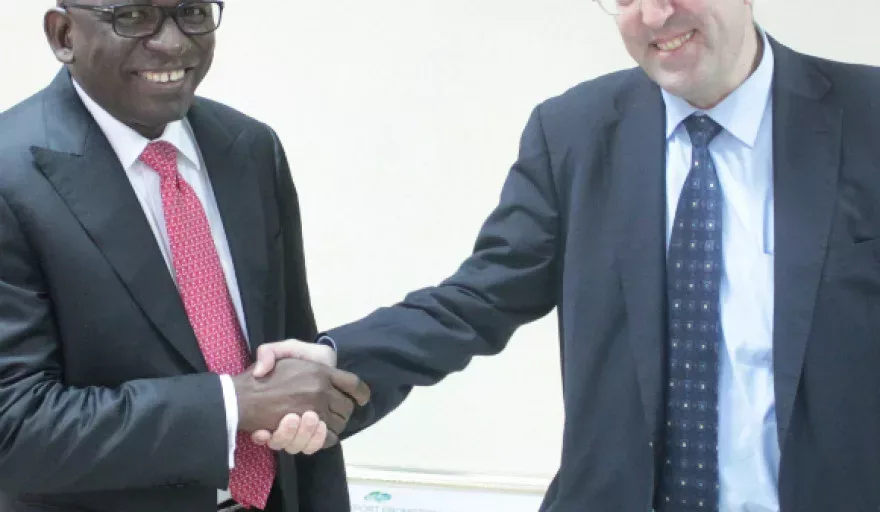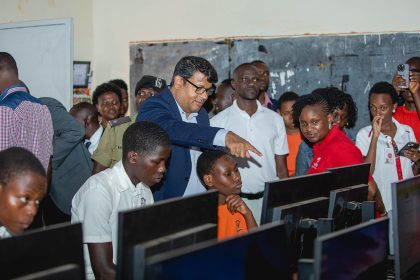The World Bank and NEXIM Bank are to potentially collaborate towards a structured intervention of Nigeria’s minerals sector to revitalise the mining industry, boost job creation and enhance foreign exchange earnings.
Roberts Ungwaga Orya, Managing Director of the Nigerian Export-Import Bank (NEXIM Bank), recently met with the World Bank to share ideas on how to provide structured intervention towards revamping and deepening Nigeria’s mining sector.
The World Bank team is led by Dr. Francisco Igualada, Senior Mining Specialist, Energy & Extractives Unit, and Linus Adie Utsu of Mining Investments Consult.
NEXIM was set up to assist the government in diversifying the Nigerian economy away from oil & gas ventures through the provision of an export credit facility, risk bearing facilities, trade and market information and export advisory services to export-oriented investors in the manufacturing, agro-processing, solid minerals and services (MASS) sectors.
Focusing on solid minerals extraction, Orya stated that Nigeria is endowed with huge solid mineral deposits, with about 34 products identified in commercial quantities in different parts of Nigeria. However, since independence in 1960, there have been many economic challenges hindering Nigeria’s ability to put in place a structure that will make the benefits of the mineral exploration available to all Nigerians.
He explained: “The low activity in the solid mineral sector is not yielding the desired financial revenues as there are scant records of payment of taxes and royalty to the government. Nigeria is losing lots of resources from untapped mineral deposits as well as from the little that is being mined illegally.”
At the moment, according to Central Bank of Nigeria (CBN), the sector accounts for only 0.14 percent of GDP, and 3.8 percent of the non-oil export revenue.
Orya further stated that despite its huge potentials, the sector is still grossly underdeveloped and dominated by SME/ artisanal and informal miners using dated machinery and equipment. There are other challenges such as poor access to long-term funding due to the capital intensive nature of the industry; lack of accredited laboratories for testing and poor road and rail infrastructure to move the products.
Since inception, NEXIM has provided investments to the tune of N7.17billion for the mining industry. This has created more than 4,302 direct jobs plus many indirect jobs. Besides direct funding, NEXIM has previously supported the Miners Association to move from their inaccessible office in Jos, Plateau State and provided them with free office spaces and facilities at the Bank’s headquarters in Abuja.
Orya queried how the country could be earning such paltry revenue and dividends with all the huge solid mineral reserves while in South Africa, the mining industry remains a cornerstone of the economy; making a significant contribution to economic activity; accounting for about 18 percent of GDP, one million jobs and more than 50 percent of foreign exchange earnings.
According to NEXIM, some of the critical issues facing Nigeria’s mining industry include how to get the government and other stakeholders to properly structure the mining sector, how to increase funding and attract much needed investment capital; infrastructural development for the industry, especially the establishment of internationally certified laboratories and setting up of internationally recognised and endorsed mining calendar for Nigeria as prevalent in other regimes with dedicated attention to solid mineral exploitation.
Dr Francisco Igualada, the World Bank Senior Mining Specialist, said there is a need for structured consolidation of efforts towards developing the sector. “This should focus on building the right capacity both at human and institutional levels; as well as establishing and enforcing the requisite legal and policy frameworks. To me, this is the difference between Nigeria and South Africa,” he said.
The World Bank has a PPP (Public Private Partnership) arrangement which it could recommend for the development of the solid minerals sector in Nigeria. Igualada stated that he will seek the commitment of his office on the development of the mining sector and collaboration with NEXIM Bank, especially in regard to workshop participation and capacity training.
Pictured: Roberts Orya, MD of Nigerian Export-Import Bank (NEXIM) and Dr. Francisco Igualada, Senior Mining Specialist, Energy & Extractives Unit, World Bank at the NEXIM Bank Headquarters
























